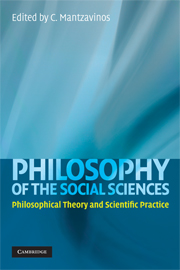Book contents
- Frontmatter
- Contents
- List of Contributors
- Acknowledgements
- Introduction
- Part I Basic Problems of Sociality
- Part II Laws and Explanation in the Social Sciences
- 4 Physicalism and the Human Sciences
- Comment
- 5 Complexity and Explanation in the Social Sciences
- Comment
- 6 The Heterogeneous Social: New Thinking About the Foundations of the Social Sciences
- Comment
- 7 What Is This Thing Called “Efficacy”?
- Comment
- Part III How Philosophy and the Social Sciences Can Enrich Each Other: Three Examples
- Epilogue
- Name Index
- Subject Index
- References
6 - The Heterogeneous Social: New Thinking About the Foundations of the Social Sciences
Published online by Cambridge University Press: 05 June 2012
- Frontmatter
- Contents
- List of Contributors
- Acknowledgements
- Introduction
- Part I Basic Problems of Sociality
- Part II Laws and Explanation in the Social Sciences
- 4 Physicalism and the Human Sciences
- Comment
- 5 Complexity and Explanation in the Social Sciences
- Comment
- 6 The Heterogeneous Social: New Thinking About the Foundations of the Social Sciences
- Comment
- 7 What Is This Thing Called “Efficacy”?
- Comment
- Part III How Philosophy and the Social Sciences Can Enrich Each Other: Three Examples
- Epilogue
- Name Index
- Subject Index
- References
Summary
Introduction: Reconsideration of the Foundations of Social Science Research
This chapter is an effort to contribute to ongoing discussions about the future of the social sciences. It has several purposes: to bring the perspective of the philosophy of social science into closer engagement with social scientists; to review some very interesting current areas of innovation in American social science research communities; and to identify some of the threads that might guide a “post-positivist” social science paradigm.
This is a particularly important time for us to develop effective and innovative programs of social science research, if scholars and policymakers are to have a reliable basis for understanding and managing the changes the world is currently undergoing. Many societies today are undergoing processes of social change that are both momentous and globally unprecedented. The processes themselves are complex and large. The causal connections between one set of changes and another set of consequences are obscure. The social, political, and human effects of these changes are large and unpredictable. And these processes are not adequately understood. We do not have comprehensive social theories for which a particular experience is the special case – whether “modernization theory,” “world systems theory,” “social functionalism,” “rational choice theory,” or “theory of exploitation.” In fact, it is a radical misunderstanding of the nature of the social, to imagine that there might be such comprehensive theories. Rather, social development is a contingent, multi-threaded social fabric.
- Type
- Chapter
- Information
- Philosophy of the Social SciencesPhilosophical Theory and Scientific Practice, pp. 154 - 178Publisher: Cambridge University PressPrint publication year: 2009
References
- 14
- Cited by



